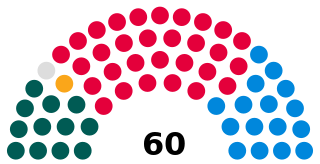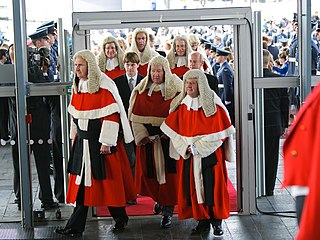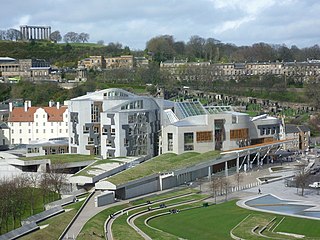
The legislatures of the United Kingdom are derived from a number of different sources. The parliament of the United Kingdom is the supreme legislative body for the United Kingdom and the British overseas territories with Scotland, Wales and Northern Ireland each having their own devolved legislatures. Each of the three major jurisdictions of the United Kingdom has its own laws and legal system.

The Scottish Parliament is the devolved, unicameral legislature of Scotland. Located in the Holyrood area of the capital city, Edinburgh, it is frequently referred to by the metonym Holyrood. The Parliament is a democratically elected body comprising 129 members known as Members of the Scottish Parliament (MSPs), elected for five-year terms under the regionalised form of additional member system (MMP): 73 MSPs represent individual geographical constituencies elected by the plurality (first-past-the-post) system, while a further 56 are returned as list members from eight additional member regions. Each region elects seven party-list MSPs. Each region elects 15 to 17 MSPs in total. The most recent general election to the Parliament was held on 6 May 2021, with the Scottish National Party winning a plurality.

The West Lothian question, also known as the English question, is a political issue in the United Kingdom. It concerns the question of whether members of Parliament (MPs) from Northern Ireland, Scotland and Wales who sit in the House of Commons should be able to vote on matters that affect only England, while neither they nor MPs from England are able to vote on matters that have been devolved to the Northern Ireland Assembly, the Scottish Parliament and the Senedd. The term West Lothian question was coined by Enoch Powell MP in 1977 after Tam Dalyell, the Labour MP for the Scottish constituency of West Lothian, raised the matter repeatedly in House of Commons debates on devolution.

The Senedd, officially known as the Welsh Parliament in English and Senedd Cymru in Welsh, is the devolved, unicameral legislature of Wales. A democratically elected body, it makes laws for Wales, agrees to certain taxes, and scrutinises the Welsh Government. It is a bilingual institution, with both Welsh and English being the official languages of its business. From its creation in May 1999 until May 2020, the Senedd was officially known as the National Assembly for Wales and often simply called the Welsh Assembly.

A legislative consent motion is a motion passed by either the Scottish Parliament, Senedd, or Northern Ireland Assembly, in which it consents that the Parliament of the United Kingdom may pass legislation on a devolved issue over which the devolved government has regular legislative authority.

The Welsh Government is the devolved government of Wales. The government consists of ministers and deputy ministers. It is led by the first minister, usually the leader of the largest party in the Senedd, who selects ministers and deputy ministers with the approval of the Senedd. The government is responsible for tabling policy in devolved areas for consideration by the Senedd and implementing policy that has been approved by it.

Politics of England forms the major part of the wider politics of the United Kingdom, with England being more populous than all the other countries of the United Kingdom put together. As England is also by far the largest in terms of area and GDP, its relationship to the UK is somewhat different from that of Scotland, Wales or Northern Ireland. The English capital London is also the capital of the UK, and English is the dominant language of the UK. Dicey and Morris (p26) list the separate states in the British Islands. "England, Scotland, Northern Ireland, the Isle of Man, Jersey, Guernsey, Alderney, and Sark.... is a separate country in the sense of the conflict of laws, though not one of them is a State known to public international law." But this may be varied by statute.

A post-legislative referendum was held in Scotland in 1979 to decide whether there was a sufficient support for a Scottish Assembly proposed in the Scotland Act 1978 among the Scottish electorate. This was an act to create a devolved deliberative assembly for Scotland. A majority (51.6%) of voters supported the proposal, but an amendment to the Act stipulated that it would be repealed if less than 40% of the total electorate voted in favour. As there was a turnout of 64% the "Yes" vote represented only 32.9% of the registered electorate, and the act was subsequently repealed.

Politics in Wales forms a distinctive polity in the wider politics of the United Kingdom, with Wales as one of the four constituent countries of the United Kingdom (UK).

In the United Kingdom, devolved matters are the areas of public policy where the Parliament of the United Kingdom has devolved its legislative power to the national legislatures of Scotland, Wales and Northern Ireland, while reserved matters and excepted matters are the areas where the UK Parliament retains exclusive power to legislate.

The Government of Wales Act 2006 is an act of the Parliament of the United Kingdom that reformed the then-National Assembly for Wales and allows further powers to be granted to it more easily. The Act creates a system of government with a separate executive drawn from and accountable to the legislature. It is part of a series of laws legislating Welsh devolution.
The Royal Commission on the Constitution, also referred to as the Kilbrandon Commission or Kilbrandon Report, was a long-running royal commission set up by Harold Wilson's Labour government to examine the structures of the constitution of the United Kingdom and the British Islands and the government of its constituent countries, and to consider whether any changes should be made to those structures. It was started under Lord Crowther on 15 April 1969, Lord Kilbrandon took over in 1972, and it finally reported on 31 October 1973.

Welsh law is an autonomous part of the English law system composed of legislation made by the Senedd. Wales is part of the legal jurisdiction of England and Wales, one of the three legal jurisdictions of the United Kingdom. However, due to devolution, the law in Wales is increasingly distinct from the law in England, since the Senedd, the devolved parliament of Wales, can legislate on non-reserved matters.

Devolution is the process in which the central British parliament grants administrative powers to the devolved Scottish Parliament. Prior to the advent of devolution, some had argued for a Scottish Parliament within the United Kingdom – while others have since advocated for complete independence. The people of Scotland first got the opportunity to vote in a referendum on proposals for devolution in 1979 and, although a majority of those voting voted 'Yes', the referendum legislation also required 40% of the electorate to vote 'Yes' for the plans to be enacted and this was not achieved. A second referendum opportunity in 1997, this time on a strong proposal, resulted in an overwhelming 'Yes' victory, leading to the Scotland Act 1998 being passed and the Scottish Parliament being established in 1999.

In the United Kingdom, devolution is the Parliament of the United Kingdom's statutory granting of a greater level of self-government to the Scottish Parliament, the Senedd, the Northern Ireland Assembly and the London Assembly and to their associated executive bodies: the Scottish Government, the Welsh Government, the Northern Ireland Executive and in England, the Greater London Authority and combined authorities.
The Commission on Devolution in Wales, also known as the Silk Commission, was an independent commission established by Welsh Secretary Cheryl Gillan on 11 October 2011. The commission was based at the Wales Office Cardiff headquarters, at Cardiff Bay and met for the first time on 4 November 2011 at the Millennium Stadium, Cardiff. The commission reviewed the case for the devolution of fiscal powers to the Welsh Assembly, now the Senedd, and considered the case for increasing the powers of the assembly. It published its findings in two parts.

The Wales Act 2014 is an act of the Parliament of the United Kingdom.

The Wales Act 2017 is an Act of the Parliament of the United Kingdom. It sets out amendments to the Government of Wales Act 2006 and devolves further powers to Wales. The legislation is based on the proposals of the St David's Day Command Paper.

The United Kingdom Internal Market Act 2020 is an act of the Parliament of the United Kingdom passed in December 2020. Its purpose is to prevent internal trade barriers within the UK, and to restrict the legislative powers of the devolved administrations in economic matters. It is one of several pieces of legislation concerning trade that were passed following the European Union membership referendum, as after Brexit the UK is no longer directly subject to EU law.

Welsh devolution is the transfer of legislative power for self-governance to Wales by the Government of the United Kingdom.












